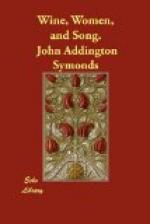The ingenuity with which these poets adapted their language to the exigencies of the tune, taxing the fertility of Latin rhymes, and setting off the long sonorous words to great advantage, deserves admiring comment. At their best, it is almost impossible to reproduce in English the peculiar effects of their melodic artifices. But there is another side to the matter. At their worst, these Latin lyrics, moulded on a tune, degenerate into disjointed verbiage, sound and adaptation to song prevailing over sense and satisfaction to the mind. It must, however, be remembered that such lyrics, sometimes now almost unintelligible, have come down to us with a very mutilated text, after suffering the degradations through frequent oral transmission to which popular poetry is peculiarly liable.
FOOTNOTES:
[Footnote 14: The more I study the songs of love and wine in this codex, the more convinced am I that they have their origin for the most part in South-Western Germany, Bavaria, the Bodensee, and Elsass.]
IX.
It is easier to say what the Goliardi wrote about than who the writers were, and what they felt and thought than by what names they were baptised. The mass of their literature, as it is at present known to us, divides into two broad classes. The one division includes poems on the themes of vagabond existence, the truant life of these capricious students; on spring-time and its rural pleasure; on love in many phases and for divers kinds of women; lastly, on wine and on the dice-box. The other division is devoted to graver topics; to satires on society, touching especially the Roman Court, and criticising eminent ecclesiastics in all countries; to moral dissertations, and to discourses on the brevity of life.
Of the two divisions, the former yields by far the livelier image of the men we have to deal with. It will therefore form the staple of my argument. The latter blends at so many points with medieval literature of the monastic kind, that it is chiefly distinguished by boldness of censure and sincerity of invective. In these qualities the serious poems of the Goliardi, emanating from a class of men who moved behind the scenes and yet were free to speak their thoughts, are unique. Written with the satirist’s eye upon the object of his sarcasm, tinged with the license of his vagabondage, throbbing with the passionate and nonchalant afflatus of the wine-cup, they wing their flight like poisoned arrows or plumed serpents with unerring straightness at abuses in high places.




